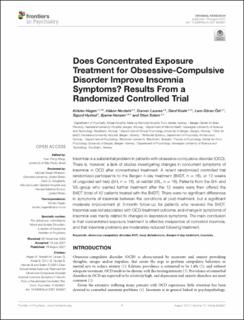| dc.contributor.author | Hagen, Kristen | |
| dc.contributor.author | Nordahl, Håkon | |
| dc.contributor.author | Launes, Gunvor | |
| dc.contributor.author | Kvale, Gerd | |
| dc.contributor.author | Öst, Lars Gøran | |
| dc.contributor.author | Hystad, Sigurd | |
| dc.contributor.author | Hansen, Bjarne | |
| dc.contributor.author | Solem, Stian | |
| dc.date.accessioned | 2022-02-08T10:28:21Z | |
| dc.date.available | 2022-02-08T10:28:21Z | |
| dc.date.created | 2021-09-20T15:33:11Z | |
| dc.date.issued | 2021 | |
| dc.identifier.citation | Frontiers in Psychiatry. 2021, 12:625631 1-8. | en_US |
| dc.identifier.issn | 1664-0640 | |
| dc.identifier.uri | https://hdl.handle.net/11250/2977672 | |
| dc.description.abstract | Insomnia is a substantial problem in patients with obsessive-compulsive disorder (OCD). There is, however, a lack of studies investigating changes in concurrent symptoms of insomnia in OCD after concentrated treatment. A recent randomized controlled trial randomized participants to the Bergen 4-day treatment (B4DT, n = 16), or 12 weeks of unguided self-help (SH, n = 16), or waitlist (WL, n = 16). Patients from the SH- and WL-group who wanted further treatment after the 12 weeks were then offered the B4DT (total of 42 patients treated with the B4DT). There were no significant differences in symptoms of insomnia between the conditions at post-treatment, but a significant moderate improvement at 3-month follow-up for patients who received the B4DT. Insomnia was not associated with OCD-treatment outcome, and change in symptoms of insomnia was mainly related to changes in depressive symptoms. The main conclusion is that concentrated exposure treatment is effective irrespective of comorbid insomnia, and that insomnia problems are moderately reduced following treatment. | en_US |
| dc.language.iso | eng | en_US |
| dc.publisher | Frontiers Media | en_US |
| dc.relation.uri | https://www.frontiersin.org/articles/10.3389/fpsyt.2021.625631/full | |
| dc.rights | Navngivelse 4.0 Internasjonal | * |
| dc.rights.uri | http://creativecommons.org/licenses/by/4.0/deed.no | * |
| dc.title | Does Concentrated Exposure Treatment for Obsessive-Compulsive Disorder Improve Insomnia Symptoms? Results From a Randomized Controlled Trial | en_US |
| dc.type | Peer reviewed | en_US |
| dc.type | Journal article | en_US |
| dc.description.version | publishedVersion | en_US |
| dc.source.pagenumber | 1-8 | en_US |
| dc.source.volume | 12:625631 | en_US |
| dc.source.journal | Frontiers in Psychiatry | en_US |
| dc.identifier.doi | 10.3389/fpsyt.2021.625631 | |
| dc.identifier.cristin | 1936202 | |
| cristin.ispublished | true | |
| cristin.fulltext | original | |
| cristin.qualitycode | 1 | |

